Summary
Analysis
Solanio and Salerio discuss the unlucky events that have befallen Antonio. It is rumored that another of Antonio's ships has been wrecked. Solanio and Salerio worry that Antonio will be ruined because of the "cruel bond" (contract) that Antonio has made with Shylock. Just then, Shylock himself appears.
Though Shylock and Antonio have made a perfectly legal contract, the Christians see Shylock's actions as "cruel." The scene also suggests that weeks or months have passed since the end of Act 2.
Themes
Quiz
Test Yourself
Shylock accuses Solanio and Salerio of having helped Jessica elope from his house. They boast that, indeed, they did help. Shylock damns them. When Solanio says that Jessica was old enough to choose her own husband and leave home, Shylock responds that, no, she is his "flesh and blood" (3.1.33) and should have stayed. Salerio taunts him that there is "more difference between thy flesh and hers than between jet (a deep black stone) and ivory" (3.1.34–5).
In 2.3:, Jessica pondered whether you are related to someone because you share blood or because you share similar "manners." Shylock here argues that "flesh and blood" are the true measure of relatedness. But Solanio and Salerio's response that the beautiful "white" Jessica is completely unlike the "black" Shylock indicates that they believe one's manners, or even one's willingness to be Christian, define relatedness.
Themes
Quiz
Test Yourself
Solanio then asks whether Shylock has heard any more news of Antonio's losses at sea. Shylock says he has, and ominously adds that Antonio can look forward to the "extraction" of his bond. Solanio can't believe that Shylock would really want a pound of Antonio's flesh, but Shylock affirms that he wants it to "feed" his "revenge" (3.1.54) on Antonio for mocking him, causing him to lose money, and insulting the Jewish "nation" (3.1.50).
In 1.3, Shylock argued that charging interest is just like breeding sheep. Now Shylock explicitly states that his desire for revenge will involve manipulating a legal obligation (the "bond," or contract) in order to treat Antonio like a piece of meat, an animal carcass, that is used as food.
Themes
Quiz
Test Yourself
Shylock goes on to say that a Jew has "hands, organs, dimensions, senses, affections, passions" and is "fed with the same food, hurt with the same weapons, subject to the same diseases, healed by the same means, warmed and cooled by the same winter and summer as a Christian is" (53–7). If you prick a Jew, he'll bleed, if you tickle him he'll laugh, if you poison him, he'll die. It follows, just as logically, Shylock argues, that if you wrong a Jew, he will seek revenge, just as a Christian would. Shylock promises to use the same "villainy" that the Venetian Christians "teach," and to beat them at their own game.
Shylock argues that what he's doing—using the legal system to persecute the Christian Antonio—is exactly what the Christians have done to him and to all Jews, which is true. And in arguing for the justice of his revenge, Shylock denies any distinction between Christians and Jews. They're all humans, he argues, based on their identical animal functions: bleeding, dying, etc. Shylock treats the need for revenge as another animal need.
Themes
Literary Devices
Quiz
Test Yourself
Get the entire The Merchant of Venice LitChart as a printable PDF.

One of Antonio's servants enters and announces that Antonio would like to see Solanio and Salerio. As they leave, Tubal, a Jewish friend of Shylock's enters. Tubal has been searching for Jessica in Genoa, and has heard rumors of her, but has been unable to find her. Shylock rants against his daughter, and bemoans his financial losses. He is especially bitter when Tubal reports that Jessica has taken a ring—given to Shylock by a woman named Leah, presumably Jessica's mother—and has traded that ring for a monkey.
The Jews Shylock and Tubal share a camaraderie that is similar to that share by the Venetian Christians. Jessica's sale of her mother's ring marks her as unfaithful to her family's past, and suggests that Jessica is willing to sell her virginity (rings often symbolized female genitalia) for animal lust (the monkey). It also foreshadows what will happen when Portia and Nerissa give rings to their husbands later in the play.
Themes
Quiz
Test Yourself
Shylock is somewhat consoled, though, when Tubal reminds him that Antonio has lost another of his ships at Tripolis, and "is certainly undone" (3.1.124). Shylock announces that he will take his pound of flesh from Antonio's heart if Antonio forfeits on his loan. He then tells Tubal to go and meet him later at the synagogue.
Shylock again insists that he will have his revenge on Antonio by enforcing the legal contract they have signed. The Jews' agreement to meet at the synagogue, implies that the Jews and Christians of Venice occupy separate social spaces.
Themes
Quiz
Test Yourself












